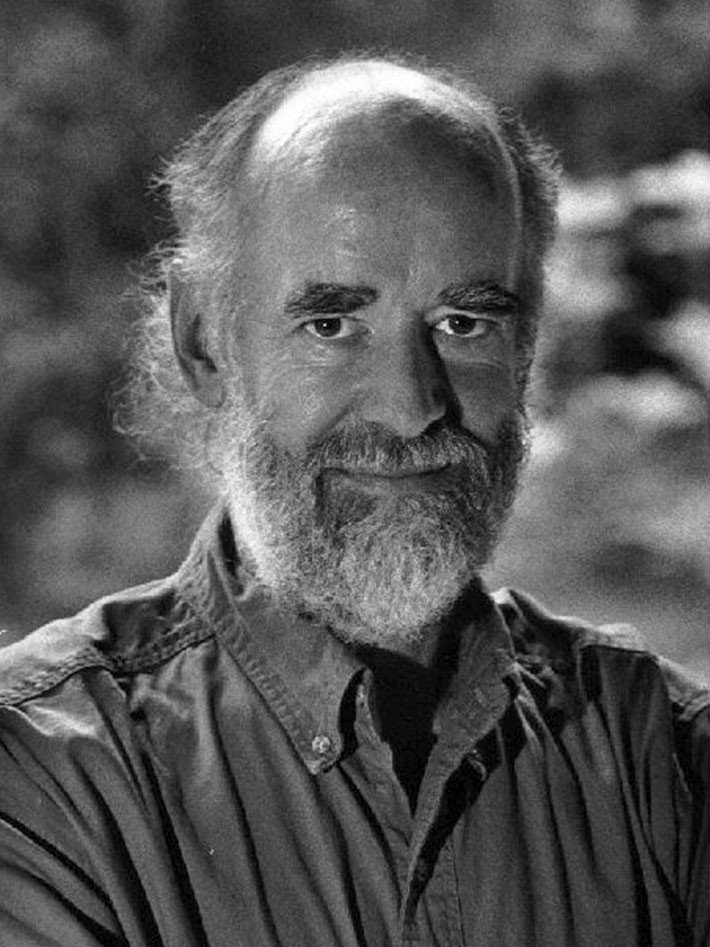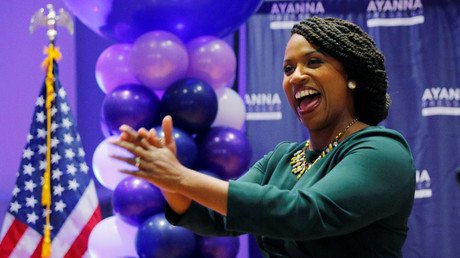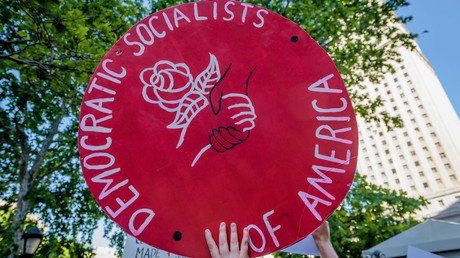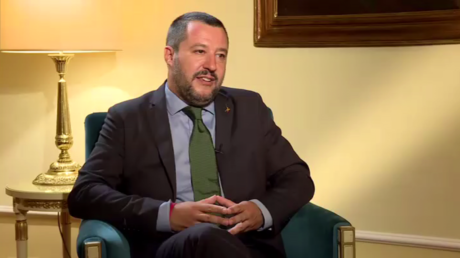Party at war with itself: DNC facing insurgency from its progressive base
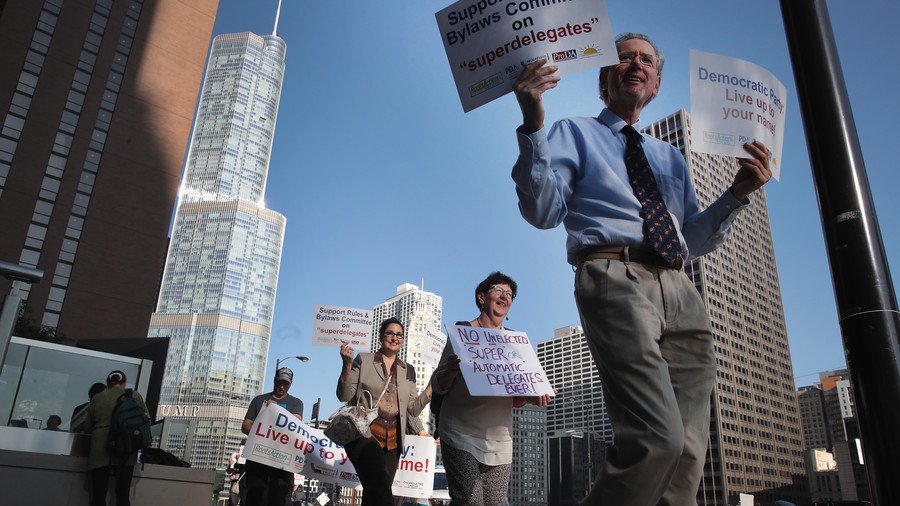
Latest knock-out of a veteran Democratic Congressman, Michael Capuano from Massachusetts, shows voters are turned off by liberals, and want more progressive candidates.
The Democratic Party leadership, composed of centrist and conservative Democrats who covet the money donated into party coffers by big Wall Street banks, arms manufacturers and the drug and medical establishment, was upset with the surprise primary victory of Alexandria Ocasio-Cortez, a young upstart Puerto Rican woman in the Bronx Queens congressional district of a 10-term House incumbent in June, as well as by victories of left and socialist candidates in various state legislative and local primaries across the country.
But now they are becoming apoplectic at the victory in Boston last week of Ayanna Pressley, socialist-endorsed black city councilwoman, over another 10-term incumbent, this time Rep. Michael Capuano, a classic mainstream liberal Congressman.
If activist Democrats – the ones who are most likely to vote in elections – are turning out even the party’s liberal stalwarts in favor of fiery radicals or even (gasp!) socialists, the whole corporatist, neo-liberal leadership of the party that has held sway since at least 1992 with the election of “third-way” Democrat Bill Clinton is at risk.
The nervousness among the party leadership these days is becoming palpable.
On Aug. 23, the Democratic National Committee (DNC), opened a three-day meeting in Chicago where the major issue discussed was not so much how to win control of Congress in the coming nationwide election set for Nov. 6, but how to slow or halt the growing influence of left-wing progressives within the party.
Topping the agenda was the continuing string of successes progressives have notched in both special elections to fill out the remaining months of the terms of office of members of Congress who have quit office early or died, and in primaries to determine the party’s candidates in both state and federal races this November.
Candidates backed by progressives and endorsed and even funded by the movement founded by independent socialist and 2016 Democratic presidential primary candidate and Hillary Clinton rival Sen. Bernie Sanders haven’t always won these races. But some have come dangerously close and enough have won, like Ocasio-Cortez, and more recently socialist Rashida Tlaib, who won the Democratic primary to become the party’s nominee to replace long-time Democratic Rep. John Conyers in Detroit to have Party leaders worried. Progressives even managed to embarrass long-time Democratic Sen. Dianne Feinstein of California by denying her the endorsement of the state’s Democratic Party during that state’s primary.
READ MORE: Did Obama really ‘snub’ Ocasio-Cortez and does it signal a split in the Democratic Party?
In Ocasio-Cortez’s case, annoyed party leaders, including former President Barack Obama, refused to endorse her after her victory. Some party leaders toyed with the idea of a third-party challenge in the general election by Crowley, the man she had just trounced — a proposal that infuriated progressives and that could risk having the seat won by a Republican by default despite the district’s overwhelming Democratic voter registration majority. (The idea seems to have died for lack of even minimal voter support.)
But so it goes for a party riven by divisions between its progressive activist base on one side, which wants national health care, aggressive action to reduce the use of fossil fuels and a switch in the national economy over to non-carbon-based energy, an end to the country’s permanent war economy with a conversion to what Ocasio-Cortez calls a “peace economy,” a national minimum wage of at least $15/hour (roughly double what it is today), and an end to the role of corporate money in backing its candidates, and on the other side a sclerotic, aging party elite, including many of its elected officials, that wants none of those things and that is wedded to raising enormous funds from corporate and wealthy donors — in many cases the same donors who are hugely bankrolling Republican candidates.
A few weeks ago, the DNC voted to reverse, after just two months, a decision to ban donations to the Democratic Party of any funds from the fossil fuel industry, a move that infuriated that activist base. As Jamie Henn, a co-founder of the environmental action group 350.org wrote angrily of the reversal, “This sort of spineless corporate pandering is why Democrats keep losing elections.”
Jeff Cohen, a journalist, media critic and founder of the grass-roots progressive action organization RootsAction.org, explains the current struggle in the Democratic party, saying "There seem to be two Democratic Parties: An elite party that stays in place and dominance because of its relations with corporate donors and corporate media – and a progressive, insurgent party that represents most Democratic voters (and most voters overall including independents) and their desires for bold changes in economic/social policy. Those two party factions are battling intensely now.”
He predicts, “In January, progressive insurgent Democrats will be represented in Congress like never before, with such newcomers as Ocasio-Cortez from New York, Tlaib from Detroit, Ilhan Omar from Minnesota and Pressley likely to win election.”
Cohen’s group organized a picket line outside the hotel where Democratic Party leaders were meeting in Chicago. At that meeting, perhaps because of the embarrassing picketing conducted by party activists, the leadership voted to bar so-called superdelegates in the next presidential nominating process in 2020 from voting for anyone in the first round of convention balloting. The commitments of almost all the 714 superdelegates to vote for Clinton at the convention – those she obtained before even the first state primary was held – were routinely added to her total by her campaign and the media during the primaries as a way to deter Sanders backers from voting, depressing his vote total and his primary delegate total. The disastrous result, for Democrats, was the election of Republican Donald Trump as president, since most polls at the time showed Sanders would have crushed Trump had he been the candidate.
The superdelegate decision was a small but important victory for progressive activists since it means the next convention nomination will be based on the votes of delegates whose candidate choice was determined by primary voters and caucus-goers, not by Party leaders.
At the state level, meanwhile, the Democrats also saw a considerable number of progressive, even openly socialist, candidates win primaries this election season, with four socialists chosen, for example, to run as Democratic candidates for state legislature this November in Pennsylvania (a state that voted narrowly for Donald Trump in 2016, but which has many more Democrats than Republicans as registered voters).
Progressive Democrats argue that the reason the party lost control of the White House and both houses of Congress narrowly in 2016 was a lack of enthusiasm for the party’s candidates, including Democratic presidential candidate Hillary Clinton, candidates who, because of their heavy dependence on campaign funds raised from corporations in the banking, arms industry, health care industry, telecom industry and even the oil and gas industry, ended up running uninspiring campaigns along the lines of “Vote for us. We’re not Republicans or Trump.”
Blue-collar workers who had lost jobs during the recent recession were angry, frustrated and scared and looking for something more positive and inspirational than that. Many, despite having long voted Democratic, turned away from that party and voted for Trump and the congressional candidates he endorsed in 2016, vainly hoping his promises to “bring back” jobs that had gone overseas would be real. Meanwhile, many progressives, despairing of Clinton’s cautious “incremental change” rhetoric, or angered at how her campaign, with the connivance of the DNC, had undermined the insurgent campaign of the progressive Bernie Sanders, voted for the Green Party or just decided not to vote. This allowed Trump to eke out narrow but key victories in several normally Democratic states like Wisconsin, Michigan and Pennsylvania.
This fall, progressives are hoping to prove their point that the Democratic Party needs to move far to the left by winning elections that the established candidates of the Democratic Party have been losing in states across the Midwest and perhaps even in the South.
A big test will be in Texas, where the polls show progressive Democrat Beto O’Rourke running neck-and-neck against the Republican incumbent Senator Ted Cruz and having a good chance of beating him in November. But the DNC has been pushing back, defeating some of those progressive hopefuls in primaries by providing heavy financial backing for more conservative incumbents or primary opponents, and by having party leaders like former vice president Joe Biden or former president Obama actively campaign for those more conservative candidates. (In O’Rourke’s case the Party has little choice but to back his candidacy if it wants to regain a majority in the Senate next year.)
It remains to be seen how all this will play out in November. If the progressives are right that the Democratic party voter base wants a more left-leaning and assertively oppositional Democratic Party that will push for such things as socialized medicine, a higher minimum wage and an end to the nation’s policy of militarism and ever larger Pentagon budgets at the expense of needed social spending at home, progressive candidates could win big this fall while traditional conservative Democratic candidates including some incumbents, go down to defeat.
How that would impact the party’s chances of retaking the House and Senate is difficult to predict at this point.
Think your friends would be interested? Share this story!
The statements, views and opinions expressed in this column are solely those of the author and do not necessarily represent those of RT.
